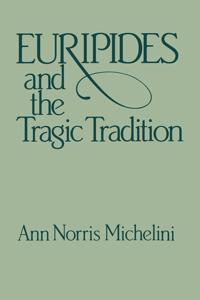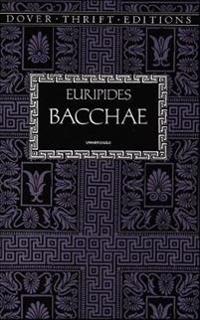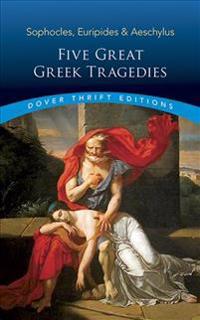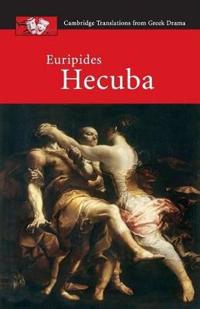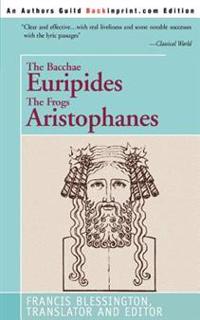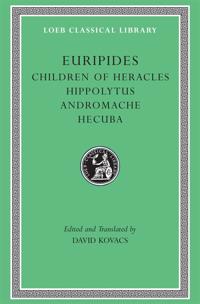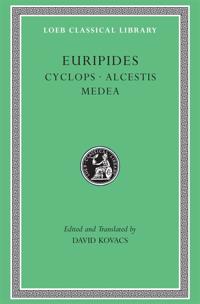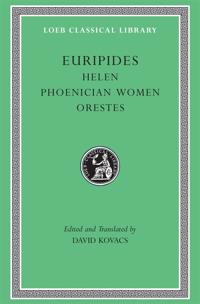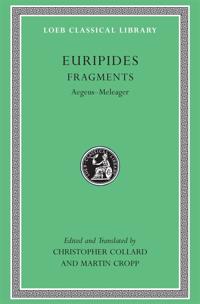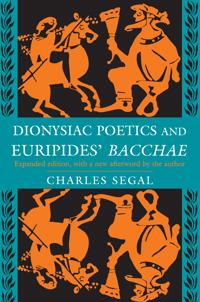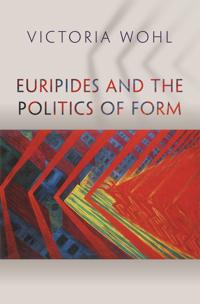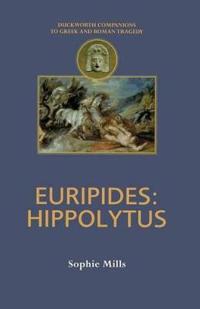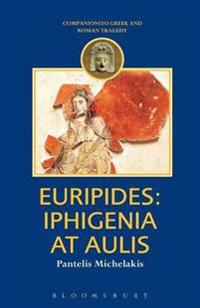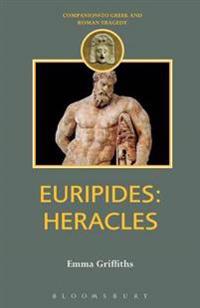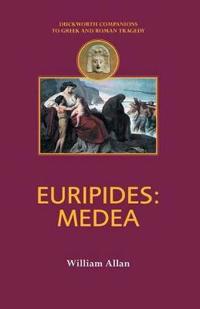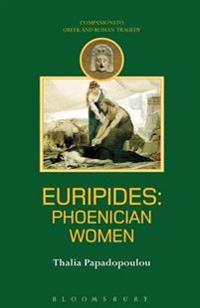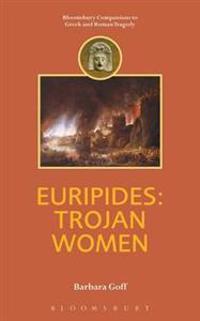Euripides V (Häftad)
avMarisha Pessl
ISBN: 9780226308982 - UTGIVEN: 2013-05Sixty years ago, the University of Chicago Press undertook a momentous project: a new translation of the Greek tragedies that would be the ultimate resource for teachers, students, and readers. They succeeded. Under the expert management of eminent classicists David Grene and Richmond Lattimore, tho[...]
Euripides and the Tragic Tradition (Häftad)
avAnn Norris Michelini
ISBN: 9780299107642 - UTGIVEN: 200702The Bacchae of Euripides (Pocket)
avWole Soyinka
ISBN: 9780393325836 - UTGIVEN: 2004-06Wole Soyinka has translated in both language and spirit a great classic of ancient Greek theater. He does so with a poet's ear for the cadences and rhythms of chorus and solo verse as well as a commanding dramatic use of the central social and religious myth. In his hands The Bacchae becomes a commu[...]
Medea (Pocket)
avEuripides
ISBN: 9780413770301 - UTGIVEN: 2002-07-18Wronged and discarded by her husband, Medea gradually reveals her revenge in its increasing horror, while the audience is led to understand the incomprehensible. This Student Edition contains a full introduction, commentary and questions for study and includes J. Michael Walton's classic transla[...]
Bacchae (Häftad)
avEuripides
ISBN: 9780486295800 - UTGIVEN: 199708Classic Greek tragedy concerns the catastrophe that ensues when the King of Thebes, Pentheus, imprisons Dionysus and attempts to suppress his cult. Striking scenes, frenzied emotion, choral songs of power and beauty.
[...]Five Great Greek Tragedies (Pocket)
avSophocles (EDT), Euripides (EDT), Aeschylus (EDT)
ISBN: 9780486436203 - UTGIVEN: 2004-06Helen (Pocket)
avEuripides
ISBN: 9780521545419 - UTGIVEN: 2008-03-31Detailed commentary, suitable for students, on one of the most skilful and original Greek tragedies.
Euripides (Pocket)
avJames Diggle
ISBN: 9780521604246 - UTGIVEN: 2004-06The surviving text of the fragmentary Phaethon of Euripides depends chiefly on two sources: two pages from a Euripidean manuscript, written about A.D. 500, and a papyrus of the third century B.C., which contains a substantial part of the parodos. These sources are supplemented by a number of citatio[...]
Euripides: Hecuba
ISBN: 9780521678254 - UTGIVEN: 2008-09Treating ancient plays as living drama. Classical Greek drama is brought vividly to life in this series of new translations. Students are encouraged to engage with the text through detailed commentaries, including suggestions for discussion and analysis. In addition, numerous practical questions st[...]
Children of Heracles (Inbunden)
avEuripides
ISBN: 9780674995338 - UTGIVEN: 199601One of Athens' greatest poets, Euripides has been prized in every age for the pathos, terror, surprising plot twists, and intellectual probing of his dramatic creations. Here are four of his plays in a new Loeb Classical Library edition. "Hippolytus" triumphed in the Athenian dramatic competition of[...]
Cyclops (Inbunden)
avEuripides
ISBN: 9780674995604 - UTGIVEN: 199412Euripides of Athens (ca. 485-406 BCE), famous in every age for the pathos, terror, surprising plot twists, and intellectual probing of his dramatic creations, wrote nearly ninety plays. Of these, eighteen (plus a play of unknown authorship mistakenly included with his works) have come down to us fro[...]
Euripides
ISBN: 9780674995741 - UTGIVEN: 1999-12Euripides (c. 485 406 BCE) has been prized in every age for his emotional and intellectual drama. Eighteen of his ninety or so plays survive complete, including Medea, Hippolytus, and Bacchae, one of the great masterpieces of the tragic genre. Fragments of his lost plays also survive.[...]
Helen (Inbunden)
avEuripides
ISBN: 9780674996007 - UTGIVEN: 200203Euripides has been prized in every age for the pathos, terror, surprising plot twists, and intellectual probing of his dramatic creations. In this volume, David Kovacs presents an edited Greek text and a faithful and deftly worded translation of three plays. For his Helen the poet employs an alterna[...]
Fragments (Inbunden)
avEuripides
ISBN: 9780674996250 - UTGIVEN: 200806Eighteen of the ninety or so plays composed by Euripides between 455 and 406 BCE survive in a complete form and are included in the preceding six volumes of the "Loeb Euripides". A further fifty-two tragedies and eleven satyr plays, including a few of disputed authorship, are known from ancient quot[...]
Euripides (Inbunden)
ISBN: 9780674996311 - UTGIVEN: 2009-02Eighteen of the ninety or so plays composed by Euripides between 455 and 406 BCE survive in a complete form and are included in the first six volumes of the "Loeb Euripides". A further fifty-two tragedies and eleven satyr plays, including a few of disputed authorship, are known from ancient quotatio[...]
Dionysiac Poetics and Euripides' Bacchae
ISBN: 9780691015972 - UTGIVEN: 1997-10In his play Bacchae, Euripides chooses as his central figure the god who crosses the boundaries among god, man, and beast, between reality and imagination, and between art and madness. In so doing, he explores what in tragedy is able to reach beyond the social, ritual, and historical context from wh[...]
Euripides and the Politics of Form (Inbunden)
avVictoria Wohl
ISBN: 9780691166506 - UTGIVEN: 2015-06How can we make sense of the innovative structure of Euripidean drama? And what political role did tragedy play in the democracy of classical Athens? These questions are usually considered to be mutually exclusive, but this book shows that they can only be properly answered together. Providing a new[...]
Euripides (Häftad)
avSophie Mills
ISBN: 9780715629741 - UTGIVEN: 200208"Hippolytus" is generally acknowledged to be one of Euripides' finest tragedies, for the construction of its plot, its use of language and its memorable characterisations of Phaedra and Hippolytus. Furthermore, it asks serious and disturbing questions about the influence of divinity on human lives. [...]
Euripides (Häftad)
avPantelis Michelakis
ISBN: 9780715629949 - UTGIVEN: 200603"Iphigenia at Aulis" dramatises the myth of Iphigenia, the young virgin sacrificed by her father Agamemnon at the start of the expedition against Troy. The ongoing debates around Iphigenia's voluntary sacrifice, the corruption of the play's moral universe, and the corruption of its text make "Iphige[...]
Euripides (Häftad)
avEmma Griffiths
ISBN: 9780715631867 - UTGIVEN: 200602In Euripides' play we see a very different figure from the Herakles of popular imagination. In his account of Herakles' maddened killing of his children, Euripides emphasises the human to the hero's character, presenting him as a loving father. Herakles is an ideal text for those new to ancient dram[...]
Euripides (Häftad)
avWilliam Allan
ISBN: 9780715631874 - UTGIVEN: 200210Euripides' "Medea" is one of the greatest and most influential Greek tragedies. This book outlines the development of the Medea myth before Euripides and explores his uniquely powerful version from various angles. There are chapters on the play's relationship to the gender politics of fifth-century [...]
Euripides (Häftad)
avThalia Papadopolou
ISBN: 9780715634646 - UTGIVEN: 200802"Phoenician Women", one of Euripides' later tragedies, is an intriguing play that arguably displays some of his finest dramatic technique. Rich in cast and varied in incident, it is an example of Euripides' experimentation with structure. It dramatises the most fertile mythical tradition of the city[...]
Euripides (Häftad)
avBarbara Goff
ISBN: 9780715635452 - UTGIVEN: 200812Set at the end of the Trojan war, "Euripides' Trojan Women" depicts the women of Troy as they wait to be taken into slavery. While choral songs recall the death-throes of the great city, the scenes between the old queen, Hekabe, and the women of her family explore the consequences of the defeat, fro[...]


